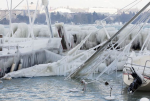You are using an out of date browser. It may not display this or other websites correctly.
You should upgrade or use an alternative browser.
You should upgrade or use an alternative browser.
Marina freezing
- Thread starter RogerJolly
- Start date
Leighb
Well-Known Member
That looks grim, was it the result of an ice storm, also known as freezing rain? That can cause widespread chaos and damage , brings down power lines etc. They had a severe one in Canada some years ago, wiped out electric power for much of Eastern Canada I recall.
mjcoon
Well-Known Member
Or maybe the result of the wind blowing the huge fountain jet over the marina? Although I visited numerous times (for meetings) I don't remember the disposition, nor when the jet was "playing". May look on Google Maps...That looks grim, was it the result of an ice storm, also known as freezing rain? That can cause widespread chaos and damage , brings down power lines etc. They had a severe one in Canada some years ago, wiped out electric power for much of Eastern Canada I recall.
TSB240
Well-Known Member
We are based in a mainly freshwater fed dock. I have not had to antifoul since buying the boat in Nov 2013. She just needs a good clean off with a pressure washer once a year. This gets rid of an algal growth on the sunny side! Boats that just come in for winter storage from their normal swinging moorings can be covered in the normal sea water growth. Most lose this within two months.Off thread so apologies
May i ask if that fresh water has much of an effect on the fouling of the hull. IE. does it reduce it down much?
Or does it stay too near the top to do any good?
I have always thought their might be a future market for a hull boat bag that you could fill with freshwater!
The downside is some years (not last) some boats that have not been used much get covered in a freshwater tube worm. It can form a massive calcified ball around props , saildrives outdrives, shafts and exposed metal keels. I believe this is common to other warmer freshwater harbours.
anoccasionalyachtsman
Well-Known Member
I seem to recall that 'frozen seawater' has very little salt in it (driven out by the crystallisation I think), so wouldn't taste salty. Quite safe in gin.In the early seventies I saw Chichester Harbour with a skin of ice about 20mm thick covering its surface as far South as East Head. It wouldn’t’ bear my weight but I tasted it and it was fresh water ice. As the tide receded it left this film of ice covering all the sand and mud banks. Iirc it was a very still cloudless day and the sun glinting on the landscape of ice was quite surreal.
Mike
Other threads that may be of interest
- Replies
- 35
- Views
- 2K
- Replies
- 15
- Views
- 826

